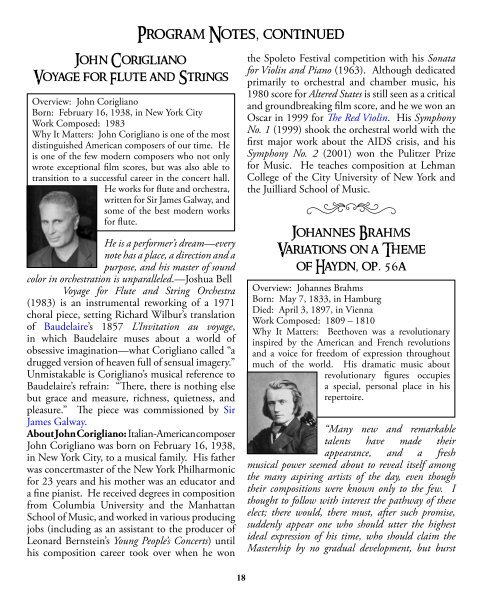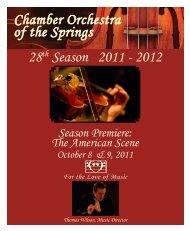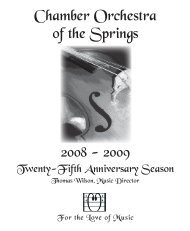Click Here For Concert Program - Chamber Orchestra of the Springs
Click Here For Concert Program - Chamber Orchestra of the Springs
Click Here For Concert Program - Chamber Orchestra of the Springs
Create successful ePaper yourself
Turn your PDF publications into a flip-book with our unique Google optimized e-Paper software.
John Corigliano<br />
Voyage for Flute and Strings<br />
Overview: John Corigliano<br />
Born: February 16, 1938, in New York City<br />
Work Composed: 1983<br />
Why It Matters: John Corigliano is one <strong>of</strong> <strong>the</strong> most<br />
distinguished American composers <strong>of</strong> our time. He<br />
is one <strong>of</strong> <strong>the</strong> few modern composers who not only<br />
wrote exceptional film scores, but was also able to<br />
transition to a successful career in <strong>the</strong> concert hall.<br />
He works for flute and orchestra,<br />
written for Sir James Galway, and<br />
some <strong>of</strong> <strong>the</strong> best modern works<br />
for flute.<br />
He is a performer’s dream—every<br />
note has a place, a direction and a<br />
purpose, and his master <strong>of</strong> sound<br />
color in orchestration is unparalleled.—Joshua Bell<br />
Voyage for Flute and String <strong>Orchestra</strong><br />
(1983) is an instrumental reworking <strong>of</strong> a 1971<br />
choral piece, setting Richard Wilbur’s translation<br />
<strong>of</strong> Baudelaire’s 1857 L’Invitation au voyage,<br />
in which Baudelaire muses about a world <strong>of</strong><br />
obsessive imagination—what Corigliano called “a<br />
drugged version <strong>of</strong> heaven full <strong>of</strong> sensual imagery.”<br />
Unmistakable is Corigliano’s musical reference to<br />
Baudelaire’s refrain: “There, <strong>the</strong>re is nothing else<br />
but grace and measure, richness, quietness, and<br />
pleasure.” The piece was commissioned by Sir<br />
James Galway.<br />
About John Corigliano: Italian-American composer<br />
John Corigliano was born on February 16, 1938,<br />
in New York City, to a musical family. His fa<strong>the</strong>r<br />
was concertmaster <strong>of</strong> <strong>the</strong> New York Philharmonic<br />
for 23 years and his mo<strong>the</strong>r was an educator and<br />
a fine pianist. He received degrees in composition<br />
from Columbia University and <strong>the</strong> Manhattan<br />
School <strong>of</strong> Music, and worked in various producing<br />
jobs (including as an assistant to <strong>the</strong> producer <strong>of</strong><br />
Leonard Bernstein’s Young People’s <strong>Concert</strong>s) until<br />
his composition career took over when he won<br />
<strong>Program</strong> Notes, continued<br />
18<br />
<strong>the</strong> Spoleto Festival competition with his Sonata<br />
for Violin and Piano (1963). Although dedicated<br />
primarily to orchestral and chamber music, his<br />
1980 score for Altered States is still seen as a critical<br />
and groundbreaking film score, and he we won an<br />
Oscar in 1999 for The Red Violin. His Symphony<br />
No. 1 (1999) shook <strong>the</strong> orchestral world with <strong>the</strong><br />
first major work about <strong>the</strong> AIDS crisis, and his<br />
Symphony No. 2 (2001) won <strong>the</strong> Pulitzer Prize<br />
for Music. He teaches composition at Lehman<br />
College <strong>of</strong> <strong>the</strong> City University <strong>of</strong> New York and<br />
<strong>the</strong> Juilliard School <strong>of</strong> Music.<br />
Johannes Brahms<br />
Variations on a Theme<br />
<strong>of</strong> Haydn, op. 56a<br />
Overview: Johannes Brahms<br />
Born: May 7, 1833, in Hamburg<br />
Died: April 3, 1897, in Vienna<br />
Work Composed: 1809 – 1810<br />
Why It Matters: Beethoven was a revolutionary<br />
inspired by <strong>the</strong> American and French revolutions<br />
and a voice for freedom <strong>of</strong> expression throughout<br />
much <strong>of</strong> <strong>the</strong> world. His dramatic music about<br />
revolutionary figures occupies<br />
a special, personal place in his<br />
repertoire.<br />
“Many new and remarkable<br />
talents have made <strong>the</strong>ir<br />
appearance, and a fresh<br />
musical power seemed about to reveal itself among<br />
<strong>the</strong> many aspiring artists <strong>of</strong> <strong>the</strong> day, even though<br />
<strong>the</strong>ir compositions were known only to <strong>the</strong> few. I<br />
thought to follow with interest <strong>the</strong> pathway <strong>of</strong> <strong>the</strong>se<br />
elect; <strong>the</strong>re would, <strong>the</strong>re must, after such promise,<br />
suddenly appear one who should utter <strong>the</strong> highest<br />
ideal expression <strong>of</strong> his time, who should claim <strong>the</strong><br />
Mastership by no gradual development, but burst




